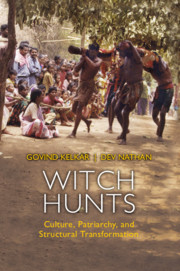2 - Culture and the Epistemology of Belief in Witchcraft
Published online by Cambridge University Press: 12 May 2020
Summary
In the Introduction, we defined a witch as a person who is perceived to cause harm by supernatural, mystical means. For such beliefs to result in witch hunts, we need three conditions: first, the belief that there are human beings who cause harm to others; second, the idea that such harm can be caused by those who have or acquire supernatural means and who can use these supernatural means; and, third, that there is collective/community acceptance of action against witches, that is, persecution of witches or witch hunts. In the latter part of the book, we will go through these three conditions and see how they are manifested in indigenous societies in India, in Africa, and also in early modern Europe.
The view of witchcraft as being the social explanation for misfortune or suffering can be looked into at various levels. One can look at witchcraft beliefs as an epistemology, a way through which the world is known. We also bring the human rights issue into the discussion of witch persecutions.
Causing harm through supernatural means
E. E. Evans-Pritchard succinctly posed the question regarding what we would call an accident of a crumbling wall falling on a particular person, ‘Why now? Why me?’ (1935, 1976: 25). As he pointed out, the answer in finding a witch who had used magic to cause harm does not rule out real, that is, physical or biological, causes; rather, it ‘is superimposed on them, and gives to social events their moral value’ (1976: 25). The entire exercise of attributing misfortune to witches was labelled as the beliefs of a ‘primitive’ type of mind existing in the cosmology of supposed ‘pre-rational’ people (J. Green 1977: 197). Obviously, we now reject the characterization of a primitive, pre-rational mind, but a whole stream of thought distinguished such supposedly pre-rational beliefs from those of rational, modern peoples.
There, however, is an important point in which the moderns can learn from indigenous beliefs. This is in the rejection of a fetishism that substitutes things for people and does not see the role of the relations between people in causing what seem to be accidents. For instance, industrial accidents are seen if not as the hand of a wrathful god, then as the inevitable result of industrial processes.
- Type
- Chapter
- Information
- Witch HuntsCulture, Patriarchy and Structural Transformation, pp. 25 - 42Publisher: Cambridge University PressPrint publication year: 2020



